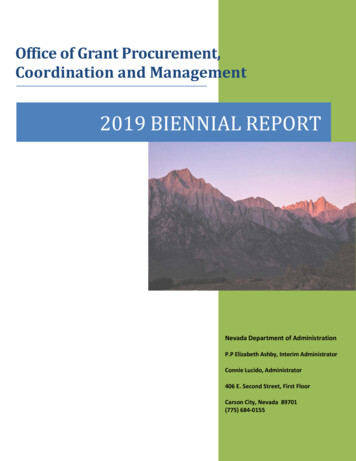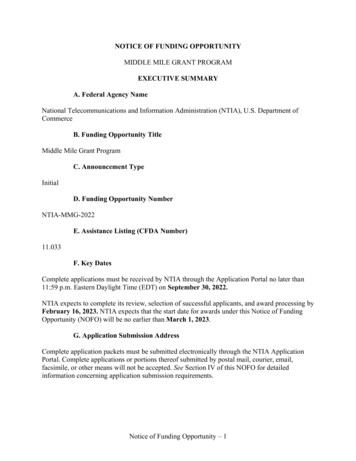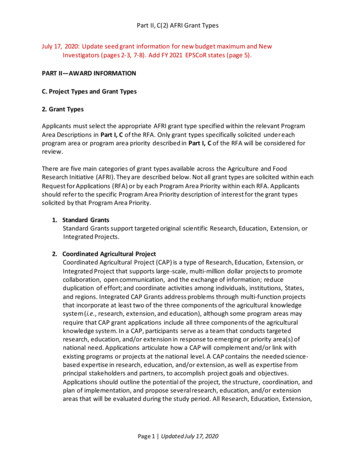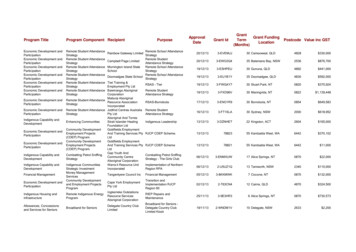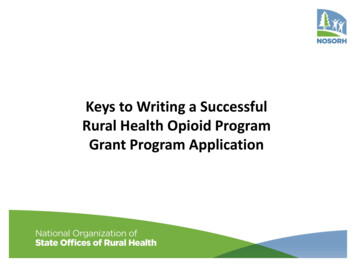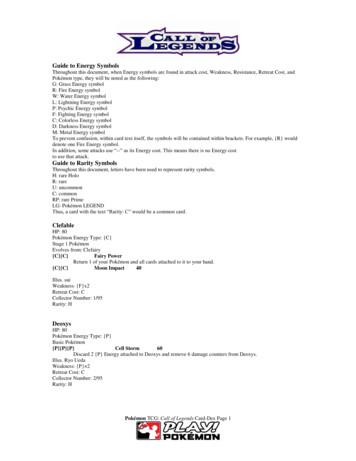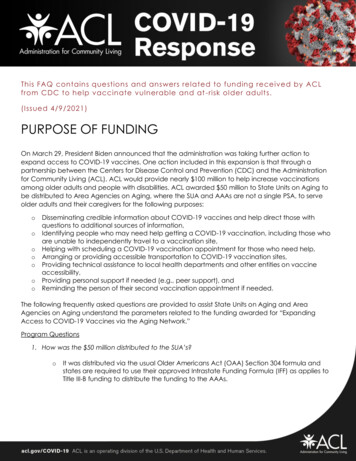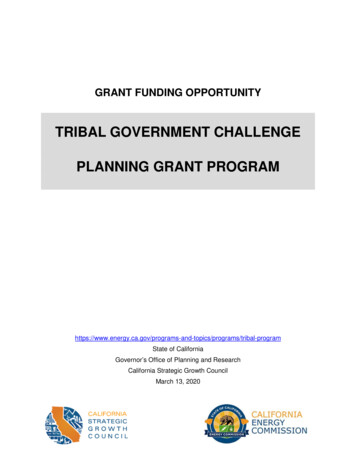
Transcription
GRANT FUNDING OPPORTUNITYTRIBAL GOVERNMENT CHALLENGEPLANNING GRANT cs/programs/tribal-programState of CaliforniaGovernor’s Office of Planning and ResearchCalifornia Strategic Growth CouncilMarch 13, 2020
Table of ContentsI.INTRODUCTION .1Background .1Goals of Solicitation .1Key Activities and Dates .2How Award is Determined .2Maximum And Minimum Award Amounts.3Proposal Assistance Webinar .3Questions . .3SGC Program Manager Contact Information .4Laws, Regulations, and Guidelines .4Registration Requirements .4II.ELIGIBILITY REQUIREMENTS .5Eligible Proposals .5Eligible Activities .6Ineligible Activities .8Indirect Cost Rate .8Match Funding Requirements .8Required Submission of Deliverables .8III. PROPOSAL FORMAT, REQUIRED DOCUMENTS, AND DELIVERY .9Required Format for a Proposal .9Method For Delivery .9Proposal Organization .9IV. EVALUATION PROCESS AND CRITERIA .12Proposal Evaluation .12Stage One: Screening Criteria .12Stage Two: Technical Evaluation of Proposals .13Scoring Scale. .14Technical Evaluation Criteria .15V.ADMINISTRATION.18Definition of Key Words .18Cost of Developing Proposal.19Confidential Information .19Payment and Accounting of Grant Funds.19Reporting Requirements .19Review and Audit Procedures .20Accounting Requirements .20Remedies for Non-Performance .20March 13, 2020Tribal Government Challenge Grant ProgramPage i
Solicitation Cancellation and Amendments .21Errors . .21Modifying or Withdrawal of Proposal .21Immaterial Defect.21Disposition of Participating Tribe’s Documents .21Participating Tribes’ Admonishment .22Agreement Requirements .22No Agreement Until Signed and Approved.22Communications .23Government Alliance on Race & Equity (GARE) .23ATTACHMENT 1: Proposal Questionnaire . A1-1ATTACHMENT 2: Proposal Narrative . A2-1ATTACHMENT 3: Scope of Work and Deliverables Schedule . A3-1ATTACHMENT 4: Scope of Work Instructions. A4-1ATTACHMENT 5: Budget Forms. A5-1ATTACHMENT 6: Contacts . A6-1ATTACHMENT 7: Budget Detail and Payment Provisions . A7-1ATTACHMENT 8: General Terms and Conditions . A8-1ATTACHMENT 9: Special Terms and Conditions . A9-1ATTACHMENT 10: Payee Data Record. A10-1March 13, 2020Tribal Government Challenge Grant ProgramPage ii
I. IntroductionBACKGROUNDThe Tribal Government Challenge planning grant program (grant program) will award funds toCalifornia Native American Tribes (Tribes) 1 to support climate and energy-related planningactivities, feasibility studies, and auditing that identify tribally tailored solutions to reducegreenhouse gas emissions and improve clean energy access while advancing climateadaptation and resiliency on Tribal lands 2 and for Tribal communities 3.As demonstrated in the November 2018 inaugural California Tribal Energy Summit sponsoredby the California Energy Commission, the State recognizes the valuable role Tribes serve inpromoting strong clean air standards as well as ambitious climate and energy goals. Tribescreate, co-author, and demonstrate leadership in research and technological advancements.Tribes can also foster innovation as well as share what they have learned with other Tribes andwith the State. More specifically, Tribes have recommended that the State assess Tribalparticipation in State Energy Programs (SEP), as well as Tribal energy needs and the availableenergy resources on Tribal lands.The program is funded through the American Recovery and Reinvestment Act of 2009 (ARRA),specifically by funds collected in repayment of past revolving loans from the highly successfulCalifornia Rural Home Mortgage Finance Authority Homebuyers Fund (CHF) Moderate IncomeSustainability Technology program, which closed in 2012. These repayments are available foruse on projects and programs related to the original ARRA guidelines. Two-million dollars ( 2million) will be available through this grant program, administered through a partnershipbetween the California Energy Commission (CEC) and the California Strategic Growth Council(SGC).These grants provide opportunities to focus on a new Tribal climate and energy planninginitiative. This grant program seeks to fund climate and energy-related planning activities,feasibility studies, and auditing to eligible Tribes in California. More information on eligibleactivities appears in Section II, Eligibility Requirements.The CEC must comply with Federal and State requirements for ARRA funding as described inthe Laws, Regulations, and Guidelines section of this solicitation.GOALS OF SOLICITATIONThis grant program is designed to help Tribes meet the challenges of adopting energy or climateplans that integrate strategies to enhance their communities and create long-term prosperity. Asthe administering agency for this grant program, SGC will invest in energy-related Tribal climate1California Native American Tribe: A “California Native American Tribe” is a Native American Tribe that is on thecontact list maintained by the Native American Heritage Commission (NAHC) for the purposes of Chapter 905 of theStatutes of 2004 (Pub. Resources Code, § 21073).2Tribal land: For the purposes of this solicitation, tribal lands refers to lands located in the State of California that aretribally owned lands, buildings, or facilities, lands a Tribe exercises jurisdiction over, or lands that the Bureau of IndianAffairs holds in trust for Tribes, individual allottees, or public domain allottees, or lands managed throughconservation easements or through lease agreement, or through co-management agreements, for the benefit ofTribes.3Tribal Communities: Tribal communities are groups of people living within reservation or allotmentboundaries, or that otherwise fall under the jurisdiction of a tribe, regardless of whether or not thosepeople are tribal members of one or another tribe or are not tribal members.March 13, 2020Tribal Government Challenge Grant ProgramPage 1 of 23
planning activities that foster the development of sustainable tribal communities. Sustainabletribal communities shall “promote equity, strengthen the economy, protect the environment, andpromote healthy, safe communities” 4.Planning activities must be consistent with Tribal values and any applicable Tribal, general, orregional plan. Proposals must outline or lay out plans, processes, or practices that reducegreenhouse gas emissions and provide benefits that increase Tribes’ adaptabilities to climatechange.Specific goals for this program are to: Support planning activities that promote clean energy access and energy efficiency, with afocus on promoting public health, reducing emissions, and supporting climate adaptationand resiliency in Tribal communities. These planning activities can include increasing accessto clean transportation and clean energy options, increasing agricultural energy efficiency,increasing energy affordability, increasing energy efficiency in buildings, and planning forclimate impacts and risks to energy systems and community members. Support the State of California’s climate and energy policies through Tribal planning andanalysis.KEY ACTIVITIES AND DATESKey activities including dates and times for this solicitation appear below. The State will releasean addendum if the dates change for the activities marked with an asterisk (*).Table 1: Key Activities and DatesACTIVITYSolicitation ReleaseProposal Assistance WebinarDeadline for Written Questions* by 5:00 p.m. PDTDistribute Questions/Answers and Addenda (if any) to solicitationDeadline to Submit Proposals by 5:00 p.m.* PDTAnticipated Notice of Proposed Award Posting DateAnticipated Agreement Start DateAgreement Termination DateACTION 22/2020July – August 2020March 31, 2022HOW AWARD IS DETERMINEDComplete proposal packages (proposals) that pass administrative and technical screening willcompete based on evaluation criteria and will be scored and ranked based on those criteria.Proposals obtaining at least the minimum passing score will be recommended for funding inranked order, and final funding decisions will be subject to programmatic considerationsincluding diversity of project types and geographic locations. Awards will be made until all fundsavailable under this solicitation are exhausted.4California Planning Priorities, Government Code § 65041.1.March 13, 2020Tribal Government Challenge Grant ProgramPage 2 of 23
If the funds available under this solicitation are insufficient to fully fund a grant proposal, SGCreserves the right to recommend partially funding that proposal. In this event, the proposedparticipating Tribe/Awardee and SGC will meet and reach agreement on a reduced scope ofwork commensurate with the level of available funding.Each agreement resulting from this solicitation includes terms and conditions that set forth theAwardee’s rights and responsibilities. SGC will not award grants to non-complying entities. SGCreserves the right to modify a grant scope and budget prior to executing agreements.MAXIMUM AND MINIMUM AWARD AMOUNTSA total of two million dollars ( 2 million) are available for grants awarded through thissolicitation. The maximum award amount is 250,000, and the minimum award amount is 150,000 per funded proposal. Per State requirements, the State will enter into a costreimbursement agreement with grant awardees that will compensate Tribes for allowable directand indirect expenditures.PROPOSAL ASSISTANCE WEBINARMarch 18, 20201:00 pm – 3:00 pm (PDT)See instructions below to participate on the GoToWebinar online meeting platform.The State will host a Proposal Assistance Webinar on Wednesday, March 18, 2020.Participation in this meeting by prospective applicants is optional but encouraged. The ProposalAssistance Webinar will be held through GoToWebinar. To participate, register 466895041035. After registering, you willreceive a confirmation email containing information about joining the webinar.This webinar will only be accessible virtually. Presentations will appear on your computerscreen, and you may listen to audio via your computer or telephone. Please be aware that thepresentation portions of both webinars will be recorded and made available after the conclusionof the webinars at rams/tribal-program.FOR ADDITIONAL INFORMATION ON HOW TO JOIN THE WEBINARS, PLEASE REFER TOTHE ABOVE WEBSITE. QUESTIONSPlease direct questions about this solicitation to the SGC program manager identified in thefollowing section. Potential applicants may submit written questions by mail, electronic mail, andby fax. All questions must be received by 5:00 pm on April 2, 2020.Question and answer sets will be emailed to all parties who both attend the webinar(s) andprovide their contact information upon registering. The State will also post the questions andanswers document on CEC’s website at: ams/tribal-program.March 13, 2020Tribal Government Challenge Grant ProgramPage 3 of 23
Any verbal communication with an SGC or CEC employee concerning this solicitation is notbinding on the State and shall in no way alter a specification, term, or condition of thesolicitation. Therefore, please direct all communication to the SGC program manager assignedto the solicitation.SGC PROGRAM MANAGER CONTACT INFORMATIONElizabeth Grassi, Program ManagerCalifornia Strategic Growth Council1400 Tenth Street; Sacramento, CA 95814(916) 327-5362tribalprograms@sgc.ca.govLAWS, REGULATIONS, AND GUIDELINESParticipating Tribes should note that activities funded by ARRA must comply with variousFederal and State requirements. While Federal or State requirements may not apply directly tosovereign Tribal governments, the agency providing grant funding is subject to these laws andis required to flow down certain requirements to any entity receiving funding. Participating Tribesshould review the Terms and Conditions applicable to this solicitation.Single Audit Act: Participating Tribes must comply with requirements of the Single Audit Act.The Single Audit Act and Office of Management and Budget Circular A-133, Audits of State,Local Governmental, and Non-profit Organizations, require entities that expend equal to or inexcess of 750,000 in a fiscal year to have an audit performed in accordance with the Act. TheAwardee must verify compliance with the Single Audit Act, if applicable, prior to SGC’s approvalof an agreement. For additional information on specific requirements, please visit the SingleAudit Requirement webpage on the State Controller’s Office web portal,https://www.sco.ca.gov/aud single audit requirement.html.Planning Purposes Only: Eligible grant activities are restricted to planning activities, and donot include any construction or ground disturbance activities. Funding exclusively climate andenergy related planning studies, feasibility studies, and auditing, allows the SGC and the CECto comply with California Environmental Quality Act (CEQA) and National Environmental PolicyAct (NEPA) requirements, by limiting proposals to activities statutorily exempt under CEQA andcategorically excluded from NEPA review to meet the ARRA fund encumbrance deadline.REGISTRATION REQUIREMENTSAll eligible participating Tribes must be registered with the following systems:Dun and Bradstreet data Universal Number System (DUNS): Prior to beginning work,participating Tribes/Awardees must obtain a DUNS number or, if necessary, update theirorganization’s information. A DUNS number is a unique identifier used by the federal governmentto track distribution of federal funds. To obtain a DUNS number or to update information, pleasego online or contact the D&B Government Customer Response Center at 1-866-705-5711.System for Award Management (SAM): All participating Tribes/Awardees must maintaincurrent registration in the SAM at all times during which they have an active award funded withARRA funds. The SAM database is the federal government’s primary registrant database. ItMarch 13, 2020Tribal Government Challenge Grant ProgramPage 4 of 23
collects, validates, stores and disseminates data in support of federal grants, cooperativeagreements, and other forms of assistance. To register, please visit SAM’s website acker.jsf#step1content. For assistance,contact the Federal Service Desk at 1-866-606-8220. Registrants must update or renew theirregistration at least once per year to maintain an active status.A DUNS number is one of the requirements for registration in the SAM.In addition, some eligible applicants may be required to register with the California Secretaryof State’s Office. California business entities as well as non-California business entitiesconducting intrastate business in California are required to register and be in good standing withthe California Secretary of State to enter into an agreement with the SGC. If not currentlyregistered with the California Secretary of State, applicants are encouraged to contact theSecretary of State’s Office as soon as possible to avoid potential delays in beginning theproposed project (should the proposal be successful). This requirement does not necessarilyapply to federally recognized Tribes, but does apply to California Native American Tribesoperating as non-profits organizations or businesses. For more information, contact theSecretary of State’s Office via its website https://www.sos.ca.gov/.II. Eligibility RequirementsELIGIBLE PROPOSALSThis is an open solicitation for California Native American Tribes to apply funds towardsplanning activities, feasibility studies, and energy auditing. The applicant must be a CaliforniaNative American Tribe (defined on page 1). Tribal health clinics, Tribal housing authorities,Tribal government business entities, Tribal non-profits, and other entities may partner with Tribalgovernments, but the primary applicant must be a California Native American Tribe.Proposal activities must be located in the State of California and must apply funds towardsplanning activities involving one or more of the following: Tribally owned lands, buildings, or facilities Lands over which a Tribe exercises jurisdiction, or lands that the Bureau of Indian Affairsholds in trust for Tribes Individual allotees Public domain allottees Lands managed for the benefit of Tribes through conservation easements, leaseagreements, or co-management agreementsWhen completed, the plans or analyses will serve as examples for other Tribes. Theparticipating Tribe will identify ways in which the Tribe will broadcast or showcase the results ofthe plan to other tribal governments.March 13, 2020Tribal Government Challenge Grant ProgramPage 5 of 23
Any federally recognized Tribe receiving a grant must provide a limited waiver of sovereignimmunity.ELIGIBLE ACTIVITIESThis grant program will fund energy, climate, and adaptation planning and feasibility studies,and auditing activities. Applicants must demonstrate a connection to energy in all planningactivities funded through this grant and are encouraged to consider climate mitigation,adaptation, and resiliency as well. Federal and State requirements for ARRA funding aredescribed in the section I of this solicitation titled Laws, Regulations, and Guidelines.The following section provides examples of eligible activities and example objectives of thisgrant; this is not a comprehensive list of topics that may be funded.1. Energy-related planning. Plans or audits conducted under this topic focus solely onenergy sources, energy use, renewable energy planning, etc.a. Project examples include:i. Energy planning studyii. Energy feasibility studyiii. Energy auditb. Sample planning objectives can include:i. Reduce energy useii. Increase energy efficiencyiii. Increase renewable energy development and procurementiv. Reduce greenhouse gas emissionsv. Improve energy grid resiliencyvi. Inform energy efficiency improvements for buildings, facilities, andtransportation.2. Climate adaptation and resiliency planning. Planning activities in this topic arebroader than above and incorporate climate change risk into energy planning for climateadaption measures into Tribal policies or Tribal lands management practices.a. Planning examples include:i. Climate change vulnerability assessment that incorporates energy systemvulnerabilitiesii. Climate adaptation planning for energy system resilienceiii. Hazard mitigation planning that incorporates energy system riskMarch 13, 2020Tribal Government Challenge Grant ProgramPage 6 of 23
b. Planning examples include:i. Climate change vulnerability assessment that incorporates energy systemvulnerabilitiesii. Climate adaptation planning for energy system resilienceiii. Hazard mitigation planning that incorporates energy system riskc. Sample planning objectives can include:i. Assess climate risks to energy systems; these can include, but are notlimited to wildfire, extreme heat and heat waves, drought, flooding, andsea level riseii. Determine tribal community members/populations most vulnerable toclimate change impacts (i.e., impoverished, youth, elderly and/or disabledcommunity members) and associated impacts of losing power or otherenergy impacts (higher energy bills because of extreme heat/extremeweather, need to upgrade energy efficiencies, etc.)iii. Develop strategies to mitigate climate risks to energy infrastructure and/orvulnerable tribal communities, including but not limited to, wildfire,extreme heat and heat waves, drought, flooding, and sea level riseiv. Improve energy resiliency to extreme weather events and other potentialdisturbances3. Sustainable communities planning. This category is the broadest of the three butplanning activities in this category must maintain a connection to energy-related topics orissues in the planning proposed. These plans would look at sustainability in a holisticway, including energy needs, climate adaptation and resilience, reduced emissions, andimproved community livability.a. Project examples include:i. Climate Action Planningii. Land Use and Energy Planningiii. Transportation Planningb. Sample planning objectives can include any of the above objectives, as well as:i. Promoting and improving public health outcomes through clean energyand/or clean transportation investmentsii. Improving access to renewable energy and clean transportationiii. Improving access to electric vehicles and charging stationsiv. Improving energy infrastructure systemsv. Reducing automobile usage and fuel consumptionApplicants should also consider and describe how results of funded planning activities will beshared with other Tribes, with a focus on replicable activities and models. The State will sharethe deliverables produced through the planning activities funding by this solicitation with thepublic and other Tribes.March 13, 2020Tribal Government Challenge Grant ProgramPage 7 of 23
INELIGIBLE ACTIVITIES This grant program will not fund construction or ground disturbance activities. The grant program cannot fund revolving loan programs or rebate programs. Proposed activities must be statutorily exempt from CEQA and be categorically excludedin NEPA. In addition, none of the awarded funds can be spent on work productsdeveloped expressly for use in a NEPA or CEQA process. Any activities that would cause direct physical change in the environment (i.e.,construction, ground disturbance, installations, and retrofits). Any activities with foreseeable indirect physical changes in the environment or thatwould have a legally binding effect on later activities. The grant program cannot fund negotiations of contracts, including contracts regardingenergy utilities, procurement, or rate adjustments.INDIRECT COST RATEThis grant funding opportunity will accept any indirect cost rate provided the applying Tribesubstantiates the rate with supporting documentation. However, please note that this is acompetitive grant solicitation and the most cost-effective proposals will be prioritized.MATCH FUNDING REQUIREMENTSThere is no match share requirement under this solicitation.REQUIRED SUBMISSION OF DELIVERABLESSGC requires all of the grant program’s awardees to submit final deliverables of the project’sbest practices and implementation templates and materials to OPR’s Integrated ClimateAdaptation and Resiliency Program Clearinghouse. The Clearinghouse shall make all data andinformation publicly available through its internet web portal, https://resilientca.org/March 13, 2020Tribal Government Challenge Grant ProgramPage 8 of 23
III. Proposal Format, Required Documents, and DeliveryREQUIRED FORMAT FOR A PROPOSALThis section contains the format requirements and instructions for how to submit a proposal.The format is prescribed to assist the participating Tribe in meeting State requirements and toenable SGC and CEC to evaluate each proposal uniformly and fairly. Participating Tribes mustfollow all proposal format instructions, answer all questions, and supply all requested data. Eachproposal must clearly reference this solicitation title, Tribal Government Challenge, on the coverpage.METHOD FOR DELIVERYThe only method of delivery for submitting a proposal in response to this solicitation is theEnergy Commission’s Grant Solicitation System, available at: https://gss.energy.ca.gov/. Thisonline tool allows applicants to submit their electronic documents to the Energy Commissionprior to the date and time specified in this solicitation. Electronic files must be in MS Wordversion 1997-2003, or version 2007 or later (.doc or .docx format) and Excel Office Suiteformats unless originally provided in the solicitation in another format. Attachments requiringsignatures may be scanned and submitted in PDF format. Completed Budget Forms,Attachment 5, must be in Excel format. The system will not allow applications to be submittedafter the due date and time.First time users must register as a new user to access the system. Applicants will receive aconfirmation email after documents have been successfully uploaded. You may contact SGCstaff identified in the Questions section of the solicitation for more assistance.PROPOSAL ORGANIZATIONTable 3: Proposal OrganizationRequirementInstructionsProposal Cover PageInclude Solicitation Title: Tribal GovernmentChallengeTable of ContentsA. Proposal QuestionnaireAttachment 1B. Proposal NarrativeAttachment 2C. Scope of Work/DeliverablesScheduleAttachments 3 & 4, Scope of Work and DeliverablesScheduleD. Project TeamE. Previous Work Products(Optional)F. Budget Forms and informationAttachment 5G. ContactsAttachment 6March 13, 2020Tribal Government Challenge Grant ProgramPage 9 of 23
A.Proposal QuestionnaireParticipating Tribes must include a complete and signed Proposal Questionnaire,Attachment 1. The questionnaire must be signed by an authorized representative of theTribe. This signature certifies that all info
greenhouse gas emissions and improve clean energy access while advancing climate adaptation and resiliency on Tribal lands. 2. and for Tribal communities. 3. As demonstrated in the November 2018 inaugural California Tribal Energy Summit sponsored by the California Energy Commission, the State recognizes the valuable role Tribes serve in
